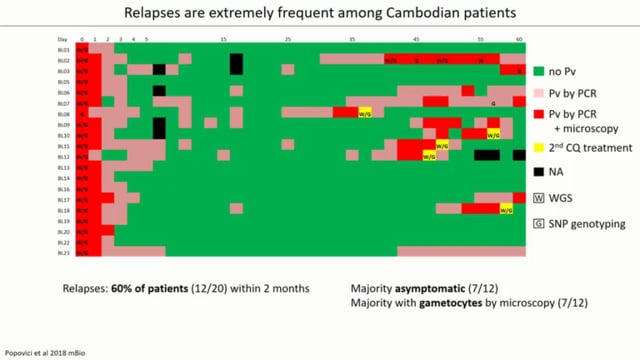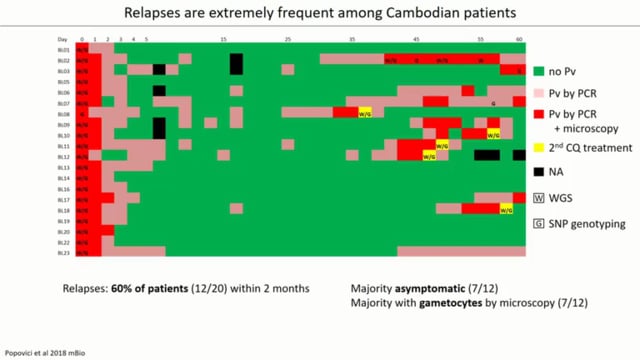ASTMH 2018, Jean Popovici: “Genomic profiling of Plasmodium vivax relapses in Cambodia”
Collaborator(s): Institut Pasteur of Cambodia (IPC), Cambodia
Countries: Cambodia
Published: 30/10/2018
In collaboration with ASTMH, Image Audiovisuals, and session presenters, MESA brings you this webcast from the 67th ASTMH annual meeting in New Orleans, October 2018
Title: “Genomic profiling of Plasmodium vivax relapses in Cambodia“
Speaker: Jean Popovici, Institut Pasteur of Cambodia, Phnom Penh, Cambodia
Session information:
October 30, 2018, 4:00 PM – 5:45 PM, Marriott – Mardi Gras D (3rd Floor)
Abstract:
Despite increased recognition of the human toll of Plasmodium vivax over the last decade, the tools in our arsenal to combat this parasite remain weak. Inability to distinguish hypnozoite-induced relapse from re-infection in endemic settings complicates chemotherapeutic assessments and obscures vivax epidemiology. A universally deployable agent to attack hypnozoites is needed, as well as diagnostics to identify hypnozoite carriers before they relapse. At the heart of these challenges lies the black box of how P. vivax establishes latent infection in the liver and what triggers relapse – how do hypnozoites go to sleep and wake up? Exciting new models to better understand the biology underlying relapse include microengineered livers, humanized mouse models, and clinical-genomic studies of vivax-infected persons who relapse outside of endemic settings. Our goal is to integrate findings gleaned from each of these models, to achieve greater insight into one of the great mysteries of malaria – How are relapses triggered? What is the evidence for an intrinisic clock vs. extrinsic triggers. Do parasites follow a molecular clock that is epigenetically regulated? Or do they simply leak out of the liver in a stochastic fashion? The co-chair will first present historical evidence of relapse periodicity in malariotherapy studies and soldier cohorts. The first part of the session will present findings from leading liver-stage models of P. vivax. The first speaker will present results from transcriptomic studies of P. vivax hypnozoites, in a microscale human liver platform that recapitulates many aspects of the complex microenvironment supporting liver-stage plasmodium infection. The second speaker will describe how relapse is recapitulated in a liver-chimeric mouse model, focusing on developmental stages of the hypnozoite as well as biomarker data in infected mice using plasma-derived exosomes. The second part of the session will present findings from field studies which reflect the real-world scenario of subjects living in endemic areas who are repeatedly exposed to vivax malaria. The symposium will highlight the utility of a soldier relapse model for testing anti-relapse interventions and present findings from a targeted deep sequencing study showing how complexity of infection appears to track with hynpozoite burden. The session will discuss findings from a closely integrated field-genomics study in Cambodia, with evidence for continuous, stochastic reactivation of hypnozoites.
THEMES: Epidemiology | Genetics and Genomics | P. vivax


